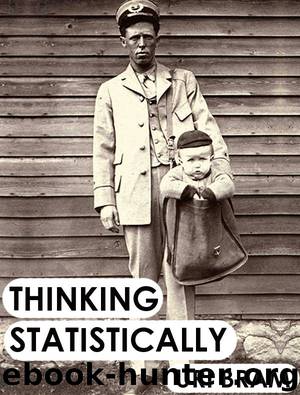Thinking Statistically by Uri Bram

Author:Uri Bram [Bram, Uri]
Language: eng
Format: mobi, epub
Tags: Statistics
Published: 2011-10-22T04:00:00+00:00
Not all that correlates is caused
If there’s one statistical maxim which is widely known among non stats-nerds it’s “correlation does not imply causation.” Correlation means, roughly, that two variables are inter-dependent: if one goes up, the other goes up with it. (If two variables are inversely correlated then as one goes up, the other goes down). Causation means, well, that one caused the other to happen. But two variables can be correlated without any causal relationship between them: it could just be coincidence, or it could be that they are both caused by an invisible third factor. Just because two things vary together does not mean one caused the other.
A classic example of “correlation does not imply causation” is the famous story that ice-cream sales over the course of a year tend to correlate with the number of drownings. Does this mean that, say, eating ice-cream causes significant groups of children to go sugar-crazy and fall in a lake? Or, even more bizarrely, that while people are drowning they suddenly consume a lot of ice-cream? Well, no. Ice-cream sales tend to go up in summer, a time when people also spend more time swimming outdoors, so rising ice-cream sales and increased drownings are both caused by warmer weather but aren’t actually related directly.*
If you think this is silly and that no-one would make such a basic causation-and-correlation mistake: well, needless to say, think again. Public Health experts in the 1940s noticed a correlation between polio cases and ice-cream consumption; they recommended cutting out ice-cream to protect against the disease. It later turned out that, you guessed it, polio outbreaks were more common in summer, and ice-cream eating was more common in summer, and polio and ice-cream had nothing to do with each other.
Another great example is that the average price of rum is strongly correlated with the average wages of kindergarten-teachers. Do rising childcare wages give more spare to exasperated teachers, bidding up rum prices? Or do higher rum prices cause people to drink less, therefore work harder, therefore spend more money on their childrens’ kindergartens? Neither, obviously: the price of basically-everything rises over time due to inflation, and this extraneous factor affects kindergarten-teachers’ wages and rum prices and the cost of houses and MPs’ salaries and almost-everything else. You can show correlation between any two price-rises and, if you’re a devious sort of person, ignore the fact that both increases are caused by an invisible third factor, the general fact that prices tend to rise over time. In fact, lots of trends tend to increase over time, and if you want to get really silly you can start to point out correlations between any two such variables, ignoring the invisible third factor (that many things increase over time, in general).
A well-known newspaper once wrote about a “striking correlation” between the number of miles driven per licensed American driver and the obesity rates in the U.S. six years later— the hypothesis was that when Americans drove more they exercised less, and (following a time-lag to allow for the change to affect physiques) they got fat.
Download
This site does not store any files on its server. We only index and link to content provided by other sites. Please contact the content providers to delete copyright contents if any and email us, we'll remove relevant links or contents immediately.
Modelling of Convective Heat and Mass Transfer in Rotating Flows by Igor V. Shevchuk(6440)
Weapons of Math Destruction by Cathy O'Neil(6280)
Factfulness: Ten Reasons We're Wrong About the World – and Why Things Are Better Than You Think by Hans Rosling(4742)
A Mind For Numbers: How to Excel at Math and Science (Even If You Flunked Algebra) by Barbara Oakley(3307)
Descartes' Error by Antonio Damasio(3279)
Factfulness_Ten Reasons We're Wrong About the World_and Why Things Are Better Than You Think by Hans Rosling(3237)
TCP IP by Todd Lammle(3185)
Fooled by Randomness: The Hidden Role of Chance in Life and in the Markets by Nassim Nicholas Taleb(3124)
The Tyranny of Metrics by Jerry Z. Muller(3073)
Applied Predictive Modeling by Max Kuhn & Kjell Johnson(3071)
The Book of Numbers by Peter Bentley(2968)
The Great Unknown by Marcus du Sautoy(2695)
Once Upon an Algorithm by Martin Erwig(2649)
Easy Algebra Step-by-Step by Sandra Luna McCune(2635)
Lady Luck by Kristen Ashley(2582)
Police Exams Prep 2018-2019 by Kaplan Test Prep(2549)
Practical Guide To Principal Component Methods in R (Multivariate Analysis Book 2) by Alboukadel Kassambara(2544)
All Things Reconsidered by Bill Thompson III(2393)
Linear Time-Invariant Systems, Behaviors and Modules by Ulrich Oberst & Martin Scheicher & Ingrid Scheicher(2371)
